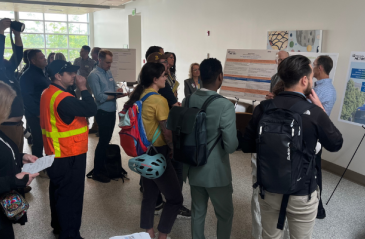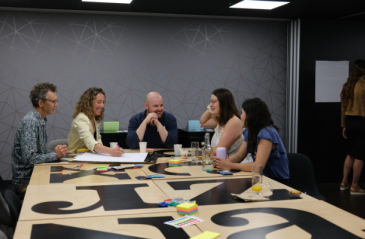
The information barriers holding back climate action and how to break them

The capability question is at the heart of many development challenges
Share articlePolicymakers need to get better at thinking about how impact will be achieved
Share articleThe powers of those working in development research remain limited
Share articleWe put our vision for government into practice through learning partner projects that align with our values and help reimagine government so that it works for everyone.
“There is a risk when experts arrive in a country that they cast their eyes over a scene, diagnose the problem in five minutes and decide what the implementation solution is,” says Michael Woolcock. “Or worse, they become pure salespeople for a specific solution just because it has worked elsewhere.”
Woolcock may himself fly in to visit various locales in the developing world, but there's little danger that he falls into this trap. A lead social development specialist in the World Bank's Development Research Group, his is a career steeped in the complexities of development. More than 75 journal articles and book chapters serve as a testament to his multiyear efforts to maximise the impact of development interventions and enhance state capability for implementation.
This capability question, he says, is at the heart of many a development challenge, serving as the “binding constraint” for anything else a government wants to do. Enhance state capability and progress will surely follow. But how?
Although his role in academia - Woolcock is a part-time public policy lecturer at Harvard's Kennedy School of Government - underlines the importance he places on understanding the theory behind development ideas and proposed remedies, he is clear that policymakers need to get better at thinking about how, not just whether, the impact of what they are proposing will be achieved. Whether an idea will work - or not - is usually discussed independently of a serious analysis of whether the designated implementing agency can actually deliver.
“Most of the discourse in development is centred around policy design but relatively little attention is given to how its stated purpose can be achieved,” he says. “Implementation encompasses all the things governments do - ranging from delivering the mail to regulating Fortune 500 companies or overseeing an effective immigration system. As development proceeds, all these tasks just get more complicated.”
He points out that those of us in the developed world forget that the delivery systems around us have taken hundreds of years to emerge, meaning that we now take for granted things that many people in the developing world can only dream of. “In OECD countries, we have become accustomed to the amazing array of systems around us that support our day-to-day lives - clean air, safe drinking water, 24/7 electricity, catching the metro, and so on. But none of this appeared overnight. In some developing countries, by contrast, electricity is infrequent at best and drinking the water might kill you - there are huge differences in capability for implementation.”
Despite the billions of dollars of aid spent over the course of many decades, the scale of these ongoing challenges means that governments in the developing world need to look harder at their internal capabilities for implementation. It's not just a case of expanding public services, he says, but also of improving the performance of the service provider.
“We need to bring greater attention to this question of implementation but also, when it is so demonstrably poor in so many countries, to what can be done strategically to enhance capabilities to deliver whatever the ‘policy' is,” he argues. “Cut-and-pasted solutions are often used in the name of greater efficiency or best practice - all with a view to short-circuiting what should be a far richer learning process. Organisations need to learn the equivalent of speaking a new language - they can't just keep on doing what they've always been doing, or told to do by donors.”
Take education, for example. Here, he illustrates the example of a high-performing school in Palestine that has made great strides by involving the parents of children in their kids' education - not something that often happens in that part of the world.
“Education is not something that happens only in a school,” he points out. “Education is something that most communities care deeply about. In the outstanding school we visited, improving learning came about in part because parents were encouraged to create half an hour of quiet time in their home, so that their child could concentrate and do their homework. It's not rocket science but in developing countries, where homes are often much smaller than those you find in developed countries, creating 30 minutes of quiet time is not straightforward. So it's about involving the parents, explaining to them the importance of that quiet time - free from the noise of the television, screaming babies or whatever. This is a small innovation that has made a big difference but, crucially, it's an innovation the Palestinian teachers themselves came up with, not external experts.”
Woolcock is currently in the midst of many projects at the World Bank, including contributing to the annual World Development Report. In 2018 its focus will be on education. It's an opportunity, he believes, for the organisation to echo the example of those who drafted the Sustainable Development Goals (SDGs), which rightly place a far greater emphasis on the outcomes of development interventions than had been the case before.
“Under the Millennium Development Goals, education success was measured by the number of kids who attended school,” he points out. “The SDGs, to their credit, have a much more stringent focus on what actually gets learned. It's easier to fake numbers or pretend that all is well if you're just focusing on attendance rates - it's much harder to get kids to actually learn something. At the World Bank we are already scoping out how we will be focusing on outcomes in the 2018 report, and lots of debate is already under way on this.”
Such material forms an important component of Woolcock's work. But he is keen to stress that, at the end of the day, the powers of those working in development research remain relatively limited. “Our job as researchers is to help people map their landscape rather than tell them what to do,” he concludes. “The onus has to be on them and their governments to deliver the change we seek, not rely on some random piece of research that's been done in a different environment by a different implementing agency. It's they who have the power to unlock the real impact.”












